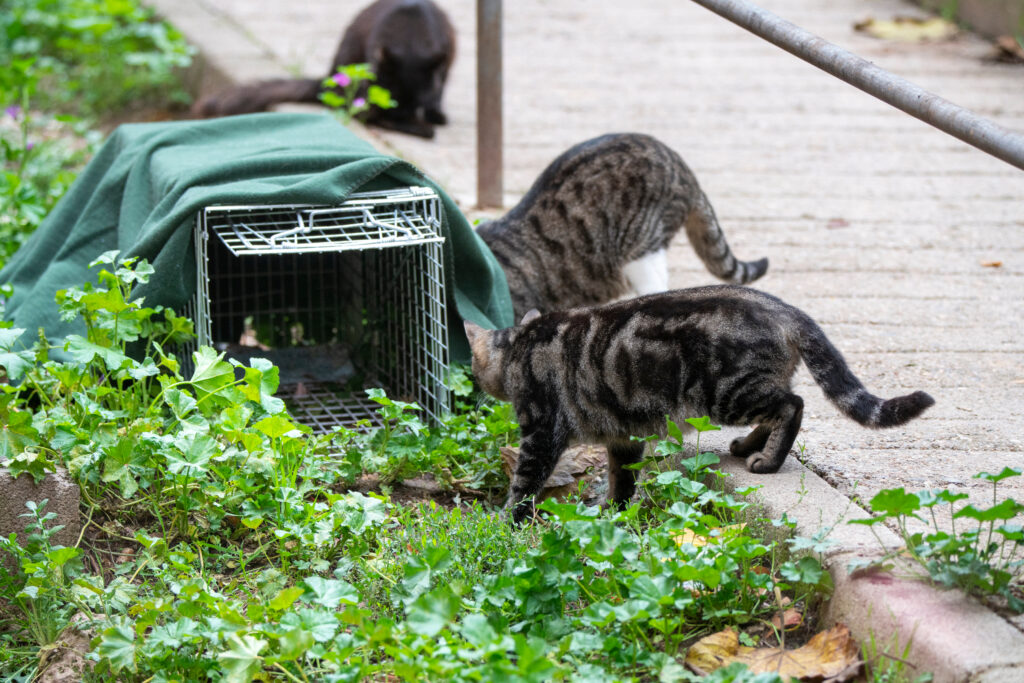by Alyssa Aldridge, Spay Memphis
The Mid-South is home to some of the most compassionate and driven animal rescue-minded people you will meet. Rescue groups collaborate with our local shelters to get-homeless pets into loving homes and our community social media pages are full of neighbors coming together to make arrangements for lost or endangered animals. There is a less-commonly talked about area of animal rescue that consists of people that volunteer to help neuter and vaccinate feral and community cats. This practice of trapping feral cats, having them neutered to prevent further litters, and returning them to their neighborhood is more simply called TNR.
Accurately counting the population of stray cats in the United States is difficult but a recent study suggests there are roughly 32 million feral cats living in the country with the vast majority living in urban areas. If you live or work in the Memphis area, there is a good chance you have seen some of these cats or they have left some unsolicited gifts in your flower beds. Some people begin doing TNR (trap, neuter, return) because they have cared for and re-homed multiple litters of kittens from feral moms. Or the local tomcats have chosen their front porch as the perfect spot to mark their territory. Most people are simply motivated by their love of cats and the desire to do what is best for them and their neighborhood.
The process of TNR begins with paying attention to the needs of your community. Does your area have a lot of cats running loose? Do you frequently see kittens? Are you or your neighbors feeding stray cats? If you answered yes to any of these, there is a good chance those cats need to be neutered and vaccinated. First you will need a live humane trap like what is used to trap a raccoon. The trap allows you to safely contain the cat and protects you from being bitten. Once you’ve acquired your trap, it is time to educate yourself on what to expect. One of the most respected advocates for TNR and feral cats is Alley Cat Allies. Their website is full of great resources for everyone from novices to pros.
When you have your trapping supplies (a live trap, canned sardines, and a blanket to cover the trap) you should spend some time familiarizing yourself with the policies of your local spay/neuter clinic or veterinary clinic that accepts feral cats. Feral cats require specialized handling by veterinary staff so it is important you confirm that the clinic accepts feral cats as patients and if they have any special policies for TNR. This is also a good time to ask for any post-surgery instructions.

You have your supplies, are familiar with your veterinary clinic’s feral policies, and are now ready to begin trapping. The best time of day for trapping is early morning and late evening. Set the trap in an area that cats frequent but make sure it is in a safe location away from traffic and dogs. Place your sardines in the trap, cover it with a blanket, and check it frequently. With patience and persistence, you will successfully trap your first feral cat.
After picking up the feral from the vet, you should receive post-surgery care instructions. Typically feral cats are recovered in the trap for 1-2 days in a temperate area like a garage, carport, or bathroom. Once the cat is recovered, you will release it at the same location it was trapped. In most cases, releasing feral cats in their original location is the safest option for them and helps prevent new cats from moving in to fill the void of relocated cats.
Don’t forget to give yourself credit for seeing something in your neighborhood that needed to be addressed and taking the initiative to fix it! Share your successes with your neighbors and ask if they are interested in joining your efforts or offering financial support. You may be surprised how willing people are to chip in and the friendships you will form along the way.
If you are interested in helping reduce the number of feral and stray cats in your neighborhood, Memphis has organizations that specialize in TNR.
• Your local animal shelter may be able to loan traps or help cover the cost of neuter and vaccinations for feral cats.
• Spay Memphis specializes in spay/neuter and offers reduced pricing for feral cats. www.spaymemphis.org.
• Bluff City Feral Friends advocates for feral cats in the city limits of Memphis by providing education and training on TNR. You can find BCFF on Facebook at Bluff City Feral Friends -TNR and Feral Cat Advocacy.
• Kitty City, Inc. offers information about TNR and local resources. www.kittycityinc.org and on Facebook.
• Memphis Pets Alive! offers assistance with TNR efforts for feral and community cats. www.memphispetsalive.org and on Facebook.
About the author: Alyssa has been involved in animal rescue since 2009. She began volunteering at Spay Memphis to learn more about TNR and has been employed at the organization since 2016. Alyssa currently lives in East Memphis and continues to do TNR and foster cats for local rescues.


